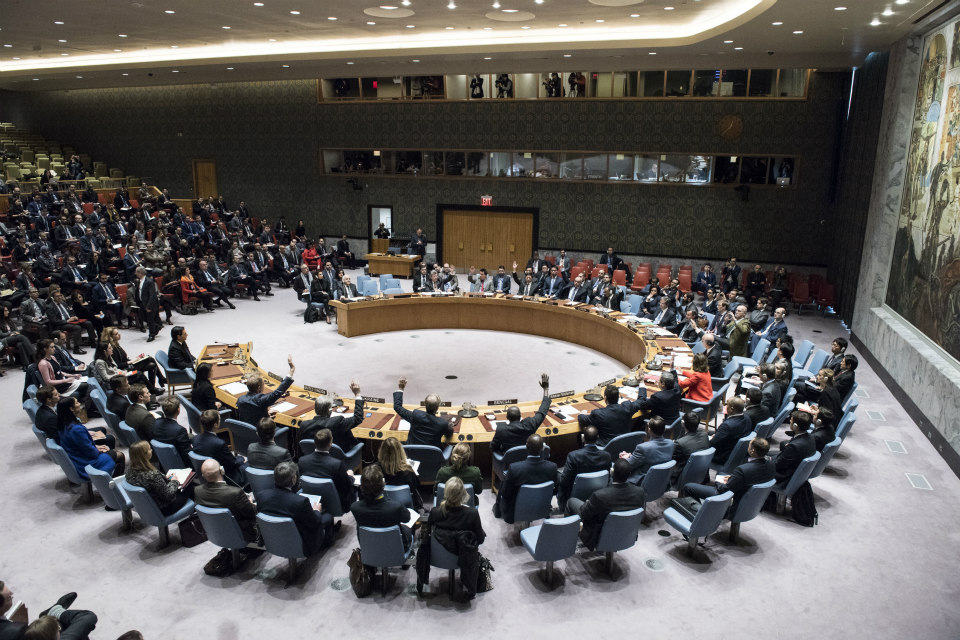"I once again reaffirm our strong support for renewed peace negotiations between the Israelis and Palestinians as soon as possible"
Explanation of Vote by Ambassador Matthew Rycroft, UK Permanent Representative to the UN, on Jerusalem Draft Resolution.

Thank you Mr President,
The United Kingdom voted in favour of the draft resolution before us today because it is in line with previous UN Security Council resolutions - including 242, 476, 478 and 2334 - and with our established position on the status of Jerusalem.
That position is clear and long-standing: the status of Jerusalem should be determined through a negotiated settlement between the Israelis and the Palestinians, and should ultimately be the shared capital of the Israeli and Palestinian states. In line with those same resolutions, we regard East Jerusalem as part of the Occupied Palestinian Territories.
As we have previously said, we disagree with the US decision unilaterally to recognise Jerusalem as the capital of Israel before a final status agreement and to move the US embassy to Jerusalem. As recent events in the region have shown, these decisions are unhelpful to the prospects for peace in the region, an aim that all of us in this Council remain committed to. The British Embassy to Israel is based in Tel Aviv and we have no plans to move it.
Importantly, the resolution that has just been voted on stressed that Jerusalem is a final status issue to be resolved through negotiations; affirmed that decisions and actions which purport to have altered the character, status or demographic composition of the Holy City of Jerusalem have no legal effect; demanded that all states comply with Security Council resolutions regarding Jerusalem; and called for the intensification and acceleration of international and regional efforts to achieve a just and lasting peace in the Middle East without delay.
Our position since the Security Council met on the 8 December has not changed. We recognise that Jerusalem holds huge significance and holiness for Jews, Muslims and Christians. We reiterate the fundamental necessity of maintaining the status quo at the Holy Sites, in particular the Temple Mount/Haram al Sharif. We continue to value Jordan’s important role as custodian of the Holy Sites, and remain fully supportive of their efforts to maintain calm.
Mr President, we must now all look forward. We share President Trump’s desire to bring an end to this conflict and welcome his commitment to a two-state solution negotiated between the parties. This includes his clear acknowledgement that the final status of Jerusalem, including the sovereign boundaries within the city, must be subject to negotiations between the parties.
Our commitment to, and position on, an Israeli-Palestinian peace agreement has also not changed. It should be based on the lines as they stood on June 4, 1967 with equal land swaps to reflect the national, security, and religious interests of the Jewish and Palestinian peoples. Jerusalem should be the shared capital of the Israeli and Palestinian states, and its status must be determined through a final status agreement. A just, fair, agreed and realistic settlement for refugees is needed that is demographically compatible with the principle of two states for two peoples. This position is consistent with the resolution before us. We now strongly encourage the US Administration to bring forward detailed proposals for an Israeli-Palestinian settlement.
We call on all parties to act with restraint, reject violence, and work together to ensure calm and stability. This will give the peace process the best chance of success. We remain fully supportive of progress towards a lasting peace and will do everything we can to achieve it.
Mr President, any peace effort needs to take account of the people, not just the land and the Holy Sites. For too long Israelis have lived in fear of rockets and terror; this wreaks havoc in people’s daily lives and renders peace hard to achieve. As do attempts by some to deny the ancient and legitimate connection of the Jewish and Palestinian peoples to Jerusalem.
For Palestinians living outside East Jerusalem including the Old City, many are effectively cut off from it. Those that can enter have to wait in long lines to pass through checkpoints. Within East Jerusalem there live more than 320,000 Palestinians. The vast majority are permanent residents, but their permits can be revoked at any point. If they apply for Israeli citizenship, and most do not, a high proportion of applications are rejected.
The lives of Jews and Palestinians – and both groups for whom Jerusalem is uniquely holy – must not be forgotten in any peace effort.
I once again reaffirm our strong support for renewed peace negotiations between the Israelis and Palestinians as soon as possible.
These should be supported by the international community and realise the vision of UN General Assembly Resolution 181 whose seventieth anniversary we marked last month: a safe and secure Israel, the homeland for the Jewish People, living alongside a viable and sovereign Palestinian state, the homeland for the Palestinian people.
Thank you.